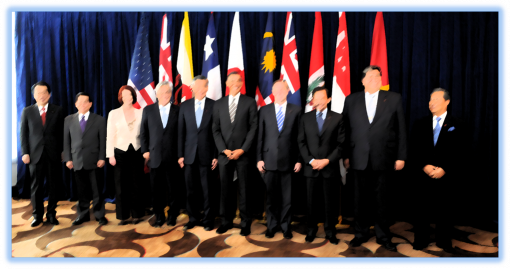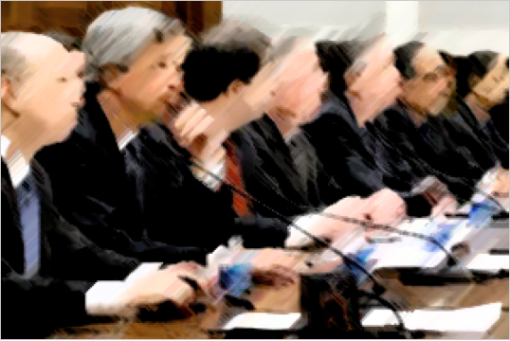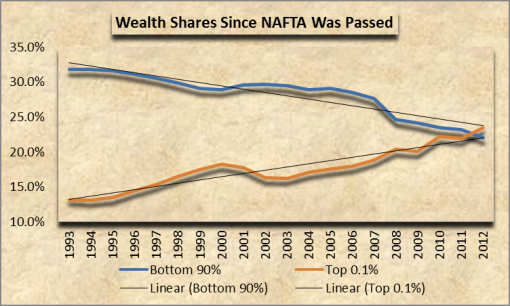The Democrats’ rebuke in recent mid-term elections and eternally low approval ratings for Congress suggest that a large number of people perceive that something is broken with American politics. What doesn’t appear to be as widely understood are the changes to Western political economy that have taken place over the last forty years that could best be described as a neo-liberal (fascist) coup. The traditional left / right divide theorized to be embodied in oppositional politics, Democrats versus Republicans, has been supplanted by the unified economic agenda of the radical right with ‘political’ differences consigned to cultural issues being decided at the state and local levels.
American politics ‘works,’ to the extent the term was ever applicable, through a residual mythology that posits distinct realms of the economic and the political. Economists write implicitly or explicitly about capitalism (e.g. ‘markets’) as if the federal, state and local governments weren’t fully integrated with ‘markets’ through government funded research and development, military entanglements in the interests of capitalists, regulations, transfers and expropriation. Politicians speak of foreign and domestic programs, legislation and regulations as if the resulting economic outcomes were unrelated to their form and intent. These tendencies are nowhere more evident than in ‘trade’ agreements, the political framework of ‘market’ relations.

Picture (1) above: representatives of the countries negotiating the TPP (Trans-Pacific Partnership) feature U.S. President Barack Obama in the center. While country representatives suggest a legal framework composed around national interests, the ultimate goal of the ‘Partnership’ is to create supranational agencies that promote corporate interests that supersede civil governance. The politicians promoting the agreement can then point to the supranational agencies to claim that anti-labor, anti-environmental and pro-privatization policies are out of their control. Democrat Barack Obama is the primary U.S. proponent of TPP. Image source: Wikipedia.
Democrats have been the more effective proponents of neo-liberal trade policies since Bill Clinton passed NAFTA in 1993. With Republicans regaining control of Congress the Democrat establishment is scrambling to claim ‘political’ differences while President Obama and Congressional Republicans promote nearly identical economic agendas through trade agreements. This ‘works’ by giving civil decision-making authority to supranational agencies through economic leverage, the right to be compensated for not destroying the world. Countries with the weakest labor protections, environmental regulations, banking restrictions and public interest legislation are being made the new ‘politics,’ the direction of ‘public’ policy via economic policy, by design.
For the large residual that retains the mythology of political and economic divide, Democrats have for forty years postured ‘politically’ while acting through economic policies. Jimmy Carter deregulated the railroads and airlines and appointed Paul Volcker Chairman of the Federal Reserve to protect bank assets from the ravages of inflation by engineering a major recession. Bill Clinton eliminated Glass-Steagall, de-regulated the banks, implemented austerity policies and attempted to privatize Social Security. And from his early days singing the praises of neo-liberalism at the Hamilton Project to his unconditional revival of the major economic force promoting neo-liberal policies— Wall Street and trust-fund ‘capitalists,’ Mr. Obama has repeatedly contradicted his pseudo-populist rhetoric with economic programs straight from the neo-liberal playbook.

Picture (2) above: the Wall Street bankers that U.S. President Barack Obama, using public resources, saved from economic ruin in 2009 have spent their subsequent years undermining bank reforms that might prevent another economic catastrophe. Inserted into the recent Federal Budget at the behest of Mr. Obama and Congressional Democrats (and Republicans) was a waiver that allows bank holding companies with federally insured deposits to engage in derivatives transactions like those that caused financial calamity is 2008 – present. Who needs a minimum wage when you have an effective unemployment rate of 10+ percent? Image source: victoryoverchase.blogspot.com.
The very idea of ‘free trade’ depends on a specious circle of premises, on the premise that ‘external’ restrictions like government regulations hinder trade while ‘internal’ restrictions like concentrated economic power— monopoly power and economic power expressed through captured state power, simply don’t exist. However, the ‘free-trade’ negotiators behind past and future trade pacts harbor no such illusions. The creation of supranational agencies, as TTP and TTIP (Trans-Atlantic Trade and Investment Partnership) do, doesn’t reduce or eliminate state power; it relocates it from civil to corporate control. And the ‘protections’ being granted are from market competition through patents and restrictions.
The economic lever at the center of these trade agreements, corporate profits, likewise assumes away monopoly power and corporate capture of state power. The most basic conception of profits, Revenues minus Costs = Profits, (R – C = P), assumes both that revenues derive from ‘free’ market prices and that capitalists bear the costs of their production. Trade agreements that protect corporations from market pricing through patents and restrictions tend to raise revenues by facilitating monopoly pricing. And with global warming increasingly in evidence, limiting environmental regulations allows these same corporations to force others to bear the costs of their production through pollution. The ‘economic’ measure of corporate profits is made wholly ‘political’ when economic leverage is granted through the right to sue for profits ‘lost’ to market competition and environmental restrictions.

Graph (1) above: Since NAFTA (North American Free Trade Agreement) was passed by Democrat Bill Clinton in 1993 the share of wealth owned by the top 0.1% of U.S. households has risen as that of the bottom 90% has fallen. The top 0.1% now owns more (fully capitalized) wealth than the bottom 90%. Trade agreements alone don’t explain this extreme concentration of wealth— financialization, a/k/a the rise of Wall Street, has been another factor. But the neo-liberal program, broadly considered, goes far in explaining it. By limiting the government’s power of civil governance while concentrating economic power through patents and restrictions that raise monopoly power modern ‘trade’ agreements have become the opposite of ‘free-trade’ pacts. Source: Emmanuel Saez.
The question of why the nominally elected representatives of a nominally democratic nation would voluntarily cede control to supranational agencies gets to the heart of present circumstance? The premise of the question is that supranational agencies, a/k/a/ multinational corporations, don’t already effectively control civil governance in the U.S. While public focus tends toward national politics, ALEC (American Legislative Exchange Council) has spent the last decade writing corporate interests into local and state legislation. And while public perceptions of Barack Obama’s bank bailouts, subsidies and guarantees tend toward corruption-lite in the form of campaign contributions; Mr. Obama’s greater betrayal was in reviving the forces of neo-liberalism rather than bringing them to heel. Had ‘market’ forces been allowed to play themselves out neo-liberalism would most likely have disappeared in a puff of smoke with Wall Street in 2008.
Those not paying close attention might miss how deeply cynical current U.S. politics, particularly those of Clinton / Obama Democrats, are. Of what value is Mr. Obama’s (nominal) support for raising the minimum wage if the trade deals he is promoting are designed remove the civil capacity for setting a minimum wage? What credibility do Mr. Obama’s environmental policies, such as they are, have when he is actively working to subvert the capacity for civil environmental regulation through trade deals? And lots of smart people are railing against Republican efforts to subvert Dodd-Frank bank ‘reforms.’ But if banking regulation is ultimately decided by the nation with the fewest bank regulations, how aren’t Republicans just doing in public what trade-deal supporting Democrats are doing out of public sight?
The light bulbs are finally, forty years late, beginning to flicker on amongst ‘progressive’ Democrats as to how radical the neo-liberal program has become. The effort at present is to parse ‘good’ from ‘bad’ neo-liberal programs without addressing that they all subvert the public interest by design. Jimmy Carter’s deregulation of the airlines and railroads shifted them from serving a quasi-public purpose— that of national transportation infrastructure, to serving ‘private’ interests alone. And his subtext was to break the airline and railroad unions. When Bill Clinton signed NAFTA it was well understood that capital is mobile but that labor isn’t. If capital can go where labor is cheap, the goal isn’t profit seeking, it is rent seeking (because labor’s product in theory is unchanged). And with the TPP and TTIP Mr. Obama is trying to complete the circle— a specific purpose of the agreements is to replace civil governance in the public interest with supranational governance in the ‘private’ interest.
FDR (Franklin Delano Roosevelt), whose legacy Democrats continue to milk for populist credibility, straightforwardly called state capture by corporate interests fascism (top link). The missing piece linking these modern trade deals to traditional fascism is nationalism. But why would supranational governance need nationalism to inspire when engineered economic dependence— immiseration, can accomplish the same outcome? Lest this seem unduly conspiratorial, the same policies that have put low and middle wage workers in the U.S. in competition with low-wage workers overseas could put doctors, lawyers and corporate executives in similar competition. That no such effort has even been entertained in forty years of neo-liberal ‘reforms’ points to the class interests that neo-liberal policies serve.
Finally, neo-liberalism re-emerged from the social compromises of the New Deal because the logic of capitalism was retained in the West. The government – market distinctions made in neo-liberal theory are wholly self-serving for those who have benefitted from them and are radically uninformed by those who have internalized neo-liberal logic. Government isn’t ‘broken,’ it has been relocated piece by piece into the hands of corporations, their agents (executives) and the rich who control them. Understanding of this state of affairs appears to be reflected in election results that rotate both corporate-state Parties in and out of office with increasing public frustration. This is to argue that the ballot box is unlikely to bring resolution no matter which Party or candidate is selling hope and change this year.
Rob Urie is an artist and political economist. His first book, Zen Economics, is written and awaiting publication. The book combines insights from fifteen years spent reading Heidegger, Marx and related philosophers while conducting empirical research and building predictive mathematical models in finance and economics. For those offended by Heidegger’s political affiliations, the relevant conclusions can be found through Aristotle and / or Edmund Husserl, both of whom preceded Heidegger, one of them by 2,400 years. A sampling of Rob’s art can be found here.